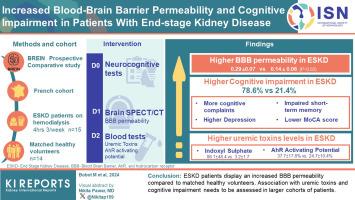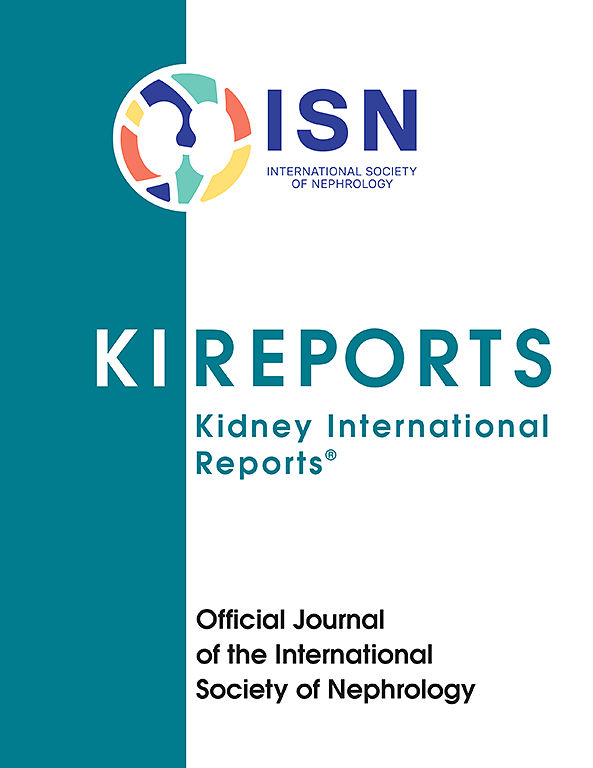Increased Blood-Brain Barrier Permeability and Cognitive Impairment in Patients With ESKD
IF 5.7
2区 医学
Q1 UROLOGY & NEPHROLOGY
引用次数: 0
Abstract
Introduction
Chronic kidney disease (CKD) is associated with an increased risk of cognitive impairment. This cognitive impairment is associated with an increased permeability of blood-brain barrier (BBB) in rodents with CKD, linked to activation of aryl hydrocarbon receptor (AhR) by indoxyl sulphate (IS). The objective of the BREIN study was to confirm the increased BBB permeability in humans with CKD.
Method
The BREIN comparative study (NCT04328415) prospectively included patients with end-stage kidney disease (ESKD) and controls healthy volunteers matched in age, sex, and level of education to a patient. In all participants, BBB permeability was quantified by brain 99mTc-DTPA SPECT/CT as a percentage of injected activity (% IA). A battery of neurocognitive tests was performed, and serum uremic toxins accumulation and AhR activation were assessed.
Results
Fifteen patients with ESKD and 14 healthy volunteers were analyzed. Patients with ESKD had higher BBB permeability compared to controls: 0.29 ± 0.07 versus 0.14 ± 0.06 %IA, P = 0.002. Patients with ESKD displayed lower Montreal Cognitive Assessment test (MoCA) score: 22.0 ± 5.0 versus 27.3 ± 2.8, P = 0.008; impaired short-term memory (doors test): 12.5 ± 3.4 versus 16.5 ± 3.4, P = 0.005; higher Beck depression score 8.1 ± 9.1 versus 2.7 ± 3.4, P = 0.046; and slightly more daily cognitive complaints: 42.5 ± 29.3 versus 29.8 ± 14.0 P = 0.060. Patients with ESKD displayed higher IS levels (86.1 ± 48.4 vs. 3.2 ± 1.7 μmol/l, P = 0.001) and AhR activating potential (37.7 ± 17.8% vs. 24.7 ± 10.4%, P = 0.027). BBB permeability was inversely correlated with MoCA score (r = −0.60, 95% confidence interval [−0.772 to −0.339], P = 0.001) in the overall population.
Conclusion
Patients with ESKD display an increased BBB permeability compared to matched healthy volunteers. Association with uremic toxins and cognitive impairment needs to be assessed in larger cohorts of patients.

终末期肾病患者血脑屏障通透性增加与认知障碍
导言慢性肾脏病(CKD)与认知障碍的风险增加有关。在患有慢性肾脏病的啮齿类动物中,这种认知障碍与血脑屏障(BBB)通透性增加有关,而血脑屏障通透性增加与硫酸吲哚酯(IS)激活芳基烃受体(AhR)有关。方法BREIN对比研究(NCT04328415)前瞻性地纳入了终末期肾病(ESKD)患者和与患者年龄、性别和教育水平相匹配的对照组健康志愿者。所有参与者的脑 99mTc-DTPA SPECT/CT 均以注射活性百分比(% IA)对 BBB 通透性进行量化。结果分析了 15 名 ESKD 患者和 14 名健康志愿者。与对照组相比,ESKD 患者的 BBB 通透性更高:0.29 ± 0.07 对 0.14 ± 0.06 %IA,P = 0.002。ESKD患者的蒙特利尔认知评估测试(MoCA)得分较低:22.0 ± 5.0 对 27.3 ± 2.8,P = 0.008;短期记忆(门测试)受损:12.5 ± 3.4 对 16.5 ± 3.4,P = 0.005;贝克抑郁评分 8.1 ± 9.1 对 2.7 ± 3.4,P = 0.046;日常认知抱怨稍多:42.5 ± 29.3 对 29.8 ± 14.0,P = 0.060。ESKD 患者的 IS 水平更高(86.1 ± 48.4 vs. 3.2 ± 1.7 μmol/l,P = 0.001),AhR 激活潜能更高(37.7 ± 17.8% vs. 24.7 ± 10.4%,P = 0.027)。结论与匹配的健康志愿者相比,ESKD 患者的 BBB 通透性增加。结论与匹配的健康志愿者相比,ESKD 患者的 BBB 通透性增加,与尿毒症毒素和认知障碍的关系需要在更大的患者群体中进行评估。
本文章由计算机程序翻译,如有差异,请以英文原文为准。
求助全文
约1分钟内获得全文
求助全文
来源期刊

Kidney International Reports
Medicine-Nephrology
CiteScore
7.70
自引率
3.30%
发文量
1578
审稿时长
8 weeks
期刊介绍:
Kidney International Reports, an official journal of the International Society of Nephrology, is a peer-reviewed, open access journal devoted to the publication of leading research and developments related to kidney disease. With the primary aim of contributing to improved care of patients with kidney disease, the journal will publish original clinical and select translational articles and educational content related to the pathogenesis, evaluation and management of acute and chronic kidney disease, end stage renal disease (including transplantation), acid-base, fluid and electrolyte disturbances and hypertension. Of particular interest are submissions related to clinical trials, epidemiology, systematic reviews (including meta-analyses) and outcomes research. The journal will also provide a platform for wider dissemination of national and regional guidelines as well as consensus meeting reports.
 求助内容:
求助内容: 应助结果提醒方式:
应助结果提醒方式:


